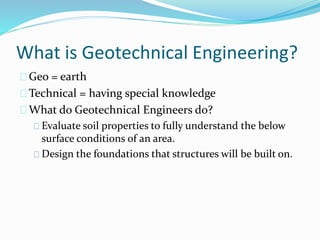All about Geotheta
All about Geotheta
Blog Article
8 Simple Techniques For Geotheta
Table of ContentsThe Facts About Geotheta UncoveredGeotheta for DummiesGeotheta - The FactsSome Known Details About Geotheta Fascination About Geotheta

They perform website investigations, gather examples, execute laboratory tests, and assess data to examine the suitability of the ground for building tasks - Geotechnical Engineers. Based on their findings, geotechnical designers give referrals for structure layout, incline stability, retaining frameworks, and reduction of geotechnical dangers. They collaborate with various other specialists, such as architects, architectural designers, and construction teams, to ensure that geotechnical factors to consider are incorporated right into the general project design and implementation
By analyzing the habits and properties of soil and rock, they can determine possible geotechnical dangers such as landslides, dirt negotiation, or incline instability. Their expertise aids protect against failings or mishaps that might threaten lives and residential or commercial property. Here are some thorough obligations and duties of a geotechnical engineer: Website Examination: Geotechnical designers conduct site examinations to gather data on subsurface problems.
They interpret the data to understand the residential properties and actions of the dirt and rock, including their stamina, leaks in the structure, compaction qualities, and groundwater conditions. Geotechnical Analysis and Design: Geotechnical designers analyze the data gathered during site investigations to evaluate the security and suitability of the site for construction projects. They execute geotechnical computations and modeling to assess elements such as birthing capability, negotiation, slope stability, side planet stress, and groundwater circulation.
Facts About Geotheta Uncovered
Structure Design: Geotechnical designers play a crucial role in designing structures that can safely support the desired framework. They assess the soil problems and load needs to figure out the ideal foundation kind, such as superficial foundations (e.g., grounds), deep structures (e.g (https://www.ted.com/profiles/47432098)., piles), or specialized methods like soil improvement. They consider variables such as negotiation limits, bearing ability, and soil-structure interaction to create optimum structure styles
They review building plans, display website activities, and carry out field inspections to validate that the layout referrals are complied with. If unpredicted geotechnical issues develop, they analyze the scenario and offer suggestions for remediation or changes to the design. Danger Assessment and Reduction: Geotechnical engineers examine geotechnical hazards and threats connected with the job site, such as landslides, liquefaction, or soil erosion.

Collaboration and Interaction: Geotechnical designers function carefully with other professionals associated with a task, such as engineers, structural engineers, and building and construction teams. Reliable interaction and cooperation are important to integrate geotechnical factors to consider into the total job style and construction process. Geotechnical designers supply technological proficiency, answer inquiries, and ensure that geotechnical requirements are satisfied.
The Single Strategy To Use For Geotheta
Below are some kinds of geotechnical engineers: Foundation Designer: Structure designers specialize in designing and evaluating foundations for structures. They examine the dirt problems, tons needs, and site features to establish one of the most suitable structure type and style, such as shallow structures, deep foundations, or specialized strategies like heap foundations.
They examine the elements affecting incline security, such as soil residential or commercial properties, groundwater problems, and slope geometry, and establish approaches to avoid slope failures and reduce dangers. Earthquake Designer: Earthquake engineers focus on assessing and making frameworks to endure seismic pressures. They assess the seismic you could try these out danger of a website, review soil liquefaction potential, and establish seismic design standards to guarantee the safety and security and durability of structures throughout quakes.
They do field testing, collect examples, and analyze the collected data to characterize the soil homes, geologic formations, and groundwater conditions at a site. Geotechnical Instrumentation Designer: Geotechnical instrumentation engineers focus on monitoring and determining the behavior of dirt, rock, and structures. They install and keep instrumentation systems that check elements such as soil settlement, groundwater degrees, slope activities, and architectural displacements to evaluate performance and provide early cautions of possible problems.
The Main Principles Of Geotheta
They carry out examinations such as triaxial tests, loan consolidation tests, direct shear examinations, and leaks in the structure examinations to gather data for geotechnical evaluation and design. Geosynthetics Designer: Geosynthetics engineers specialize in the style and application of geosynthetic products, such as geotextiles, geogrids, and geomembranes. They utilize these products to boost dirt stability, reinforce inclines, give drain solutions, and control erosion.
They often tend to be investigatory people, which indicates they're intellectual, introspective, and analytical. They are interested, methodical, rational, logical, and sensible. Some of them are also social, implying they're kind, charitable, participating, individual, caring, helpful, understanding, skillful, and pleasant - Consulting Engineers.
In the workplace setting, geotechnical engineers utilize specialized software application tools to do computations, create designs, and evaluate information. They prepare reports, review task requirements, interact with customers and staff member, and coordinate job activities. The office setup provides a favorable atmosphere for study, analysis, and collaboration with other experts associated with the job.
The smart Trick of Geotheta That Nobody is Talking About
They frequently check out project websites to perform website investigations, analyze geotechnical problems, and gather information for evaluation. These check outs include traveling to different areas, in some cases in remote or difficult terrains. Geotechnical designers may perform soil tasting, conduct tests, and monitor building and construction activities to guarantee that the geotechnical aspects of the job are being applied properly.
Geotechnical designers also function in specialized geotechnical research laboratories. In these centers, they carry out experiments, do examinations on dirt and rock samples, and evaluate the engineering buildings of the materials. Geotechnical laboratory engineers work extensively in these settings, managing testing equipment, running tools, and videotaping data. They collaborate with other laboratory staff to make sure exact and trustworthy screening outcomes.
Report this page